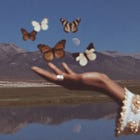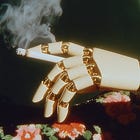There's a somewhat startling moment in intellectual development when you realize that most of what you believe isn't actually yours. The political positions, moral frameworks, aesthetic preferences, even the metaphors you use to understand reality—much of it arrived pre-assembled, inherited from family, school, peer groups, or whatever ideological tribe you stumbled into through proximity or circumstance.
This realization can be unsettling because we like to think our worldview emerges from careful consideration, from weighing evidence and arriving at reasoned conclusions. But in reality, most people operate their entire lives within the scaffolding they were handed, making minor adjustments around the edges but never questioning the foundational architecture.
But there's a different path available—one that requires more courage and yields something far more valuable: the conscious construction of a personal philosophy. Not through revolutionary rejection of everything that came before, but through a quieter, slower alchemy of noticing, choosing, refining. A more careful process of examination, testing, and integration. Of letting what no longer serves you burn off in the fire. What emerges isn't just another set of beliefs, but a lens for seeing that's genuinely your own.
Consider how worldviews typically form. From childhood, we absorb a complex ecosystem of assumptions about how the world works, what matters, who to trust, what constitutes progress, justice, beauty, truth. These frameworks arrive bundled with emotional associations, social identities, and tribal loyalties that make them remarkably resistant to change.
The liberal inherits frameworks about systemic oppression, the conservative about personal responsibility, the tech optimist about innovation as progress, the environmentalist about humanity as destroyer. Each framework contains genuine insights, but they also contain blind spots, oversimplifications, and ideological commitments that can obscure rather than illuminate reality.
The problem isn't that these inherited worldviews are wrong—it's that they're incomplete and often untested. More insidiously, power hides in narrative. Control hides in cliché. And most moral panic is just unresolved trauma trying to legislate itself. The frameworks we inherit aren't just incomplete—they're often designed to serve someone else's interests rather than our understanding. And when you operate entirely within an inherited framework, you're not thinking; you're pattern-matching against pre-existing templates.
Most people never move beyond this stage. They spend their intellectual energy defending positions they never chose rather than exploring questions they haven't answered. They mistake consistency with coherence, loyalty with truth, and tribal belonging with authentic belief.
But occasionally, something cracks. Perhaps it's encountering evidence that doesn't fit your existing framework. Perhaps it's noticing the gap between what your ideology predicts and what you actually observe. Perhaps it's simply the accumulated weight of contradictions that can no longer be ignored or explained away.
For me, this moment came through sustained contact with ideas that weren't supposed to make sense within my inherited liberal framework. I'd been raised on women's studies, identity politics, and systemic explanations for everything. These weren't bad frameworks—they contained real insights about power, privilege, and historical injustice. But they also contained assumptions about human nature, motivation, and causation that increasingly felt too narrow to contain what I was learning about the world.
The crack widened as I engaged with thinkers who operated from different premises: evolutionary psychologists who explained behavior through biological rather than social lenses, economists who revealed how incentives shape outcomes in ways ideology often misses, philosophers who questioned the very categories I'd been taught to accept as natural and obvious.
This wasn't a Damascus road conversion from one ideology to another. It was something more subtle and more profound: the recognition that reality is far more complex than any single framework can capture, and that intellectual honesty requires being willing to hold contradictory truths in productive tension rather than resolving them prematurely through ideological simplification.
What follows this recognition is a kind of alchemy—the slow transformation of inherited materials into something genuinely personal. This process can't be rushed or systematized because it requires integrating not just ideas, but experience, intuition, and the particular constellation of insights that emerge from your unique position in the world.
The first stage involves careful examination of what you actually believe versus what you think you're supposed to believe. This requires unusual honesty because it means acknowledging that some of your inherited positions might be wrong, incomplete, or simply irrelevant to your actual experience of the world.
The second stage involves deliberate exposure to contradiction. This means seeking out thinkers who operate from different premises, engaging with evidence that challenges your assumptions, and cultivating what Keats called "negative capability"—the ability to remain in uncertainty and doubt rather than irritably reaching after fact and reason.
The third stage is integration—the patient work of building a coherent framework that can accommodate complexity without losing explanatory power. You begin sorting the true from the inherited—not just intellectually, but spiritually. You experiment. You read people you were warned not to read. You notice what energizes your system and what drains it. You start to track signal. You stop posturing. You stop performing. This isn't intellectual relativism where all positions are equally valid, but rather a more sophisticated understanding that different frameworks might be useful for different questions, and that wisdom often lies in knowing when to apply which lens.
One of the most liberating aspects of this process is moving beyond the standard political spectrum entirely. When you stop identifying primarily with any pre-existing tribe, you're free to evaluate ideas on their merits rather than their tribal associations. You can appreciate insights from evolutionary psychology without becoming a biological determinist, acknowledge the importance of individual responsibility without ignoring systemic factors, or recognize the value of tradition without opposing all change.
This doesn't mean simply becoming a centrist—centrism is often just another form of intellectual laziness that splits differences rather than transcending them. It means developing what we might call "orthogonal thinking"—the ability to operate from principles that cut across traditional ideological boundaries.
For instance, I find myself defending both feminist insights about historical male dominance and contemporary concerns about the erosion of healthy masculinity. These positions seem contradictory only if you're operating within a framework that sees gender as a zero-sum competition rather than a complex system where multiple things can be true simultaneously.
Similarly, I can appreciate both the importance of scientific rigor and the legitimate concerns about institutional capture in scientific institutions. I can value both technological innovation and the wisdom embedded in traditional practices. I can support both individual freedom and social cohesion.
Over time, this process of conscious worldview construction creates something recognizable—what we might call an intellectual signature. Like a writer's style or an artist's technique, it becomes a distinctive way of approaching problems, asking questions, and synthesizing information.
Eventually, something rare happens: you start to see through your own lens. Not the one given to you. The one earned. Because no one else has lived your exact life, what emerges is utterly singular. There are over eight billion people on Earth, but there is only one lens that sees the world the way you do.
People develop trust in certain thinkers not because they agree with everything they say, but because they recognize a quality of thinking that feels authentic, rigorous, and genuinely curious about truth rather than merely defensive of positions. These thinkers surprise us because they're not simply reproducing tribal talking points—they're processing information through a lens they've consciously constructed. They have a signal we can feel. And that signal doesn't come from allegiance to any one tribe. It comes from living in contact with reality.
This is why we value intellectual diversity—not the superficial diversity of demographics, but the deeper diversity of genuine differences in how people see and interpret reality. When someone has done the hard work of building their own worldview, they bring something genuinely original to the conversation.
This is fundamentally about developing taste as intelligence—the capacity to discern quality, relevance, and truth across different domains without relying solely on external validators. Taste, in this sense, isn't aesthetic preference but intellectual discernment: the ability to recognize signal amid noise, depth beneath surface appeal, and authentic insight within performative thinking.
I used to think worldviews were about beliefs. But they're not. They're about how you metabolize complexity. How you listen. How you decide what matters. How you build an internal compass instead of outsourcing judgment to your peers.
Just as your body metabolizes food by breaking it down, extracting nutrients, and eliminating waste, a mature worldview metabolizes information by evaluating it, integrating useful insights, and discarding what doesn't serve understanding.
People with underdeveloped worldviews tend to either accept information wholesale or reject it entirely based on whether it fits their existing framework. People with mature worldviews can extract value from sources they don't entirely agree with while maintaining coherent principles that guide their integration of new information.
This metabolic capacity is what allows for genuine intellectual growth rather than mere accumulation of facts or adoption of fashionable opinions. It's what enables someone to learn from critics, acknowledge the limits of their own perspective, and update their understanding without losing their intellectual center.
A worldview is a form of aesthetic. A moral geometry. A sense of shape and scale. It's how you measure meaning and contradiction. It's how you decide who to trust, what to build, and what to leave behind. They're a form of authorship. And this authorship, when practiced long enough, becomes alchemy.
The goal of this alchemical process isn't to create an abstract philosophical system divorced from practical concerns, but to develop a way of thinking that enhances your ability to navigate actual decisions in a complex world. A good worldview should help you evaluate opportunities, assess risks, understand other people, and make choices that align with your deepest values.
This is where the mental models of great thinkers become invaluable. When you study how figures like Elon Musk approaches first principles thinking, or how Steve Jobs developed taste as a form of intelligence, you're not just learning their conclusions—you're reverse-engineering their cognitive processes. You're learning how they built frameworks for processing complexity without losing clarity.
The practice isn't about mimicking their specific decisions but understanding their methods for decision-making. How do they separate signal from noise? How do they maintain conviction while remaining open to new information? How do they think about risk, timing, and resource allocation? These become tools you can adapt to your own circumstances and challenges.
This means your worldview needs to be both principled and pragmatic, both stable enough to provide consistent guidance and flexible enough to accommodate new information. It should help you distinguish between what you can and cannot control, what fights are worth having, and what goals are worth pursuing. Most importantly, it should feel like yours—not in the sense of being arbitrary or purely subjective, but in the sense of being genuinely integrated with your experience, your values, and your understanding of how the world actually works.
Building an authentic worldview isn't a project you complete; it's a practice you maintain. As you encounter new experiences, gain new knowledge, and develop new capacities for understanding, your worldview should evolve accordingly. The goal isn't to achieve some final, perfect philosophy, but to maintain a living system of thought that continues to serve truth-seeking rather than ego protection.
This is why I developed what I call THE DAILY 5—a simple framework for maintaining this ongoing work of self-awareness and worldview refinement. Just five minutes a day of stream-of-consciousness reflection, checking in with what you actually think versus what you think you should think. No agenda, no prescribed outcomes, just honest contact with your own mental landscape.
The practice emerged from a simple recognition: small inputs scale. A few honest minutes each day of examining your reactions, questioning your assumptions, and noticing what energizes versus drains your thinking can gradually transform how you see everything. It's not about dramatic revelations but about maintaining the kind of intellectual hygiene that keeps your worldview responsive to reality rather than calcified around comfortable certainties.
This requires intellectual humility—the recognition that your current understanding is always provisional and that wisdom often lies in acknowledging the limits of what you know. It also requires courage, because authentic worldview construction inevitably means thinking thoughts and reaching conclusions that don't fit neatly into any pre-existing tribal identity.
The people who do this work well become intellectual resources for the rest of us—not because they have all the answers, but because they've developed reliable methods for engaging with questions. They show us what it looks like to think rather than merely react, to integrate rather than merely accumulate, and to maintain curiosity in an age of certainty.
THE DAILY 5 QUICK LINKS —
✦ Need help getting started?
✦ Start building your foundation with WEEK ONE
In the end, what marks an authentic worldview isn't its political affiliation or ideological purity, but its relationship to truth. Does it help you see more clearly? Does it enhance your ability to predict and navigate reality? Does it generate insights that prove useful over time? Does it maintain coherence under pressure without becoming rigid?
This is perhaps the most important intellectual skill for our time: the ability to think independently while remaining open to learning, to maintain principles while adapting to new information, and to build something genuinely your own while remaining connected to the broader human conversation about how to live and what to value.
When someone has done the hard work of conscious worldview construction, you can sense it in how they think—the quality of their questions, the nuance of their observations, the way they hold complexity without losing clarity. They've moved beyond borrowing other people's thoughts to generating their own insights.
I don't care what label someone wants to pin on me—left, right, centrist, contrarian. All I care about is: does it hold up to reality? Can it withstand contradiction without crumbling into dogma? Can it make space for nuance without losing its edge?
If you don't tend to your worldview, someone else will build one for you—and rent it back to you through media, marketing, and memes. The alchemy of worldview is available to anyone willing to do the work. It requires time, courage, and intellectual honesty, but it yields something irreplaceable: the capacity to see through your own eyes rather than someone else's lens.
Not everyone will like what you become. That's part of it. But if you build something true—something that genuinely reflects how you see, what you've learned, what you can't unsee—they'll always know it's yours. And more important than anything else: so will you.
XO, STEPF



























Loved this piece! It’s like a gentle slap to the brain, a reminder that half the things I believe aren’t really ‘mine’ until I test them. Tyler made the messy work of shaping a worldview feel less like philosophy class and more like personal alchemy. Enjoyed it
This is, in essence, the meaning of life. Root yourself in higher truth and reclaim your childlike sense of wonder.
The paradox, of course, is that in letting go of everything that isn’t real, you gain the world instead. All it costs is constant ego death, nbd or anything 🤣